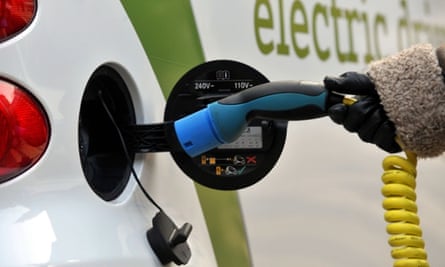Tesla Motors has unveiled its new electric sport utility vehicle (SUV), the Model X, with much fanfare in California.
The debut comes amid growing speculation that low-carbon vehicles are finally on the verge of a breakthrough after the Volkswagen emissions scandal.
The Model X has been billed by Tesla and its chief executive, Elon Musk, as the company’s most advanced vehicle to date.
The specifications and the look of the Model X will certainly catch the eye of motorists who have become disillusioned by the traditional automotive industry in light of VW cheating emissions tests on diesel cars.
Musk claims the scandal shows the time has come for carmakers to “move to a new generation of technology” or face being wiped out.
“What the Volkswagen [scandal] is really showing is that we’ve reached the limit of what’s possible with diesel and gasoline,” he said.
However, the launch of the Model X was two years later than scheduled and it will cost consumers up to $144,000 (£95,000).

“I’m not sure anyone should make this car,” Musk said at the launch. “There’s far more there than is really necessary to sell the car.”
The car is the latest step in Musk’s plan to transform the automotive industry, and he has his eyes on developing fully autonomous cars within the next three years.
But Tesla, which was founded in 2003, is yet to make a profit and delivered just 31,655 cars in its last financial year. In the UK, just 15,869 ultra low-emission vehicles were registered in 2014, although this was a 264% increase on the previous year.
David Bailey, professor of industry at Aston Business School in the Midlands, said electric cars remain a luxury product at present due to their cost.
However, he said the emissions crisis could be a “profoundly important moment” in the automotive industry and encourage electric carmakers to step up their investment in research and development.
Diesel cars face tighter regulations and greater taxation, Bailey added, and the mayors of leading cities could restrict their movement in favour of low-carbon vehicles.

“The cost of electric cars has held back the development of a mass market,” Bailey said. “A gamechanger could be the Gigafactory [which will be the biggest battery factory in the world] that Tesla is building.”
Apart from its price, the Tesla’s Model X represents a step-up in electric car technology. The electric4x4 can reach 60mph in 3.2 seconds, has a top speed of 155mph and its battery charge lasts for 25o miles.
The car is equipped with seven seats, a 43cm touchscreen for controlling driving and entertainment systems, and double-hinged falcon wing doors that can open with just 30cm of space either side of the car.
The Model X also includes an array of sensors, including a radar and sonar system that applies the brakes if there is danger of an accident, and doors that open automatically when the driver approaches.
With Tesla and a string of other ambitious companies developing electric cars, analysts at Fitch, the credit-rating agency, believe the VW crisis could spark a turning point in the industry.
Emmanuel Bulle, senior director of corporates at Fitch, said: “Regulators will reassess the timeline to reach planned more stringent emission limit targets and could review the targets themselves.
“The scandal could accelerate the underlying growth of vehicles with alternative powertrains, including fuel cells, electric and hybrid engines.”
Other electric car contenders

The internet multinational has developed a driverless car with a top speed of 25mph, two seats, and a screen displaying its route. “The intention is that the passenger gets in the vehicle, says into microphone ‘Take me to Safeway’ and the car does the entire journey,” said Sarah Hunter, head of policy at GoogleX, the company’s advanced technology arm.
In order to work, the car requires detailed maps with road features such as lanes, roundabouts and traffic lights accurate to within 1cm. Google is manufacturing a “few hundred” of the cars and Californian authorities are working on regulations to pave the way for the operation of driverless vehicles on its roads.
Apple
Perhaps the rival that the automotive industry fears the most, rumours about Apple building a car have been fuelled by the maker of the iPhone and iPad poaching staff from carmakers.
The Apple car is codenamed as Project Titan and the company wants to launch it in 2019, according to recent reports in the US. Apple has held talks with US officials about testing the vehicle, although it is not clear whether the car will be fully autonomous.
The firm has been keen on developing a car for a long time. Mickey Drexler, the boss of fashion chain JCrew and a former Apple board member, has said: “Steve Jobs, if he had lived, was gonna design an iCar. I think cars have an extraordinary opportunity for cool design.”
Wheego
A US company that was spun out of Ruff & Tuff Electric Vehicles, a manufacturer of recreational electric vehicles such as golf carts. Wheego imported car frames from China and fitted them with electric drivetrains and batteries in the US. Its first car, the Wheego Whip, was launched in 2009 and only capable of speeds of up to 35mph and a range of 50 miles.
However, the Wheego LiFe, its second vehicle, can reach 65mph and was the third electric car approved for use on US highways after the Tesla Roadster and the Nissan Leaf.
BYD
BYD is China’s answer to Tesla and has found a powerful ally in Warren Buffett, the veteran investor, who controls a 10% stake in the company. Trading in the company’s shares has been volatile, but its e6 electric car is already used for chauffeur services in London and taxis in the city of Shenzhen in China.
It has designed and built London’s first zero-emission double-decker bus, which launches in October, and has become a major manufacturer of rechargeable batteries.
Comments (…)
Sign in or create your Guardian account to join the discussion